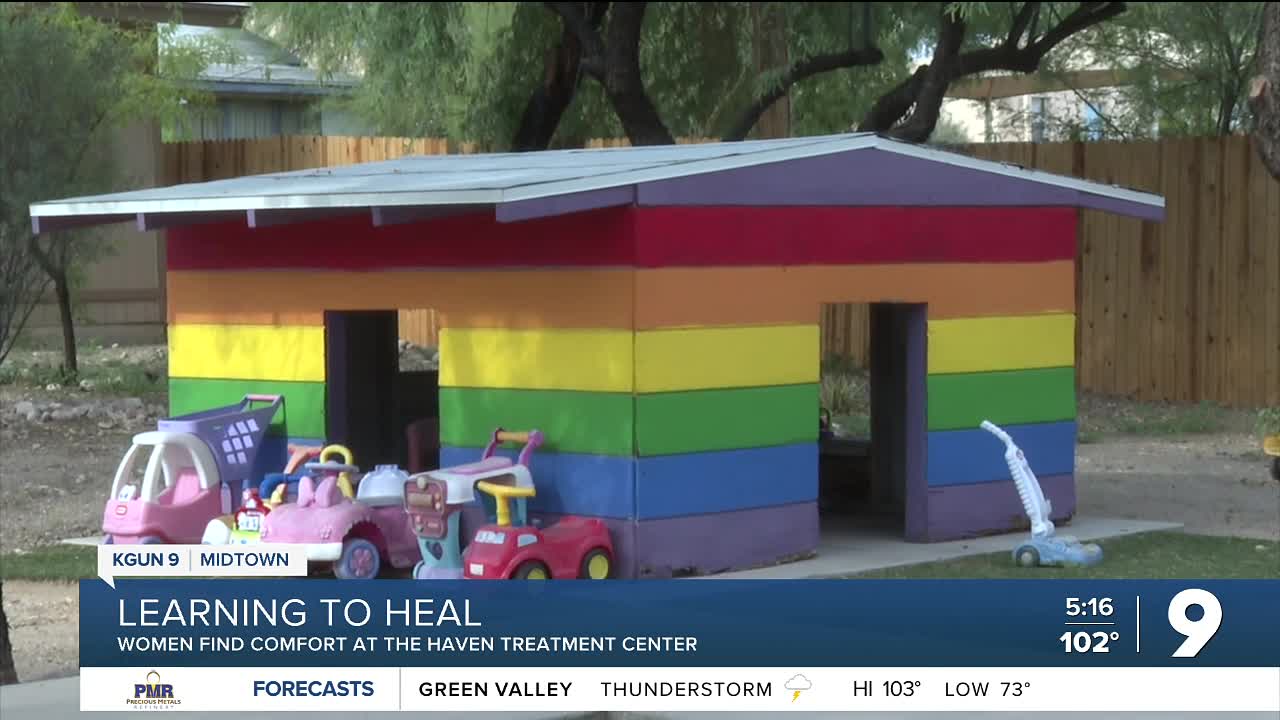TUCSON, Ariz. (KGUN) — For more than half a century, the Haven treatment center in midtown has been a refuge for women seeking a way out of addiction.
Founded in 1970 by a small group of women, the center still embraces its original mission: providing a safe, women-only space to heal, recover and grow.
Today, the Haven treats around 500 women each year, focusing not just on breaking substance use habits but on addressing the emotional wounds beneath them, such as grief, depression, anxiety and trauma.
For Tara Myers, recovery began with facing those deeper wounds. She grew up on the Tohono O’odham Nation in an alcoholic household and began drinking as a teen.
“There was just nothing else to do,” she said. “It was a lot easier to get caught up in that cycle.”
After losing her mother and brother, along with her sister to murder, Myers’ life spiraled out of control.
“I used my addiction as a coping mechanism to bury all that pain,” Myers said. “I would relapse, and when I relapsed, I would lose everything.”
That included custody of her three children, who are now in a foster home after being removed from her custody nine months ago.
Seeking help, she entered the Haven, where she connected with the center’s Native Ways program, which blends Indigenous culture, traditions and spiritual practices into recovery.
A CDC report found that non-Hispanic native people had the highest rate of overdose deaths in both 2020 and 2021.
“I had lost hope in a higher power. I felt completely alone,” she said. “So to embrace the culture of who I am, you know, as a Native American, it reinforced it a lot. I like that this program acknowledges the native culture, the native heritage and doesn’t exclude us.”
The Haven also gave her a sense of community. “When we do our serenity prayer, we pray for the sister to our left and the sister to our right, that we may stumble but we’ll never fall.”
Myers will graduate from the program this week and enter the Haven's Intensive Outpatient Program, located near the residential center. Throughout the program, clients are provided wrap-around services while they adjust to their new life and their new sobriety.
Myers says she's 30 days sober and is excited for the path ahead. She looks forward to the moment her kids can return. In the meantime, she says she's happy that they are being cared for in a loving home.
Kristen Luzania’s path to the Haven began at age 17, when she started using drugs with her boyfriend. She says unhealthy relationships repeatedly pulled her back into addiction. “I would date good men but I would self-sabotage because I didn’t think I was good enough for them,” she said.
She tried other co-ed treatment programs but found the presence of men distracting.
“They told me men were my problem,” Luzania said. “So coming here with just a bunch of ladies, I really got to focus on myself. I’ve never had self-love in my life. I spent a long time disliking myself.”
A recent brush with the law brought her to the Haven for a second time.
“Now that I’ve lost everything, everything is beautiful to me, like taking a shower instead of a jail shower,” she said. “I love looking at the moon. My daughter’s first word in Spanish was ‘luna,’ so I always look at the moon and know she’s looking at it too.”
She wishes people would show more compassion for those struggling with addiction.
“I think a lot of people stigmatize and judge addicts and say they’ve done it to themselves,” she said. “In a way, it is true, but I think a big part of it is not shutting them out of your life and being there when they’re ready.”
Andrea Dorazio, now a peer support counselor at the Haven, knows what that support can mean. After 17 years of homelessness and addiction, she got clean in 2020.
“I lost people and I lost hope,” she said. “I was the saddest person, but there was a little flicker in me.”
Her experiences now help her guide others.
“The traumas, being unhoused, these are all amazing gifts I am now able to give to people in the form of relatability and hopefully inspiration and hope,” Dorazio said. “It doesn’t matter what you’ve been through. We’re all unique people, but what we can all share is that amazing hope and ability to get that recovery and a better life.”
The Haven’s Vice President of Communications and Development, Emilia Honkasaari, says the residential program typically runs for an average of 60 days, with some stays lasting up to 90 days. Outpatient treatment is also available for 90 days.
She adds that there is currently room for more clients, with about half of the facility’s beds open.
Those interested will need to complete a pre-screen, and if they’re still actively using, they may need to attend a hospital-level detox before entering the residential facility.
For Myers, Luzania, and Dorazio, the Haven has been more than just treatment. It’s been a source of self-discovery, cultural connection and hope.
“Self-love, I just didn’t have that within me,” Myers said. “I didn’t realize I had suffered from depression really bad and anxiety. Now, I’m learning to forgive myself for the things I put myself through.”
She described a familiar feeling around those using addiction to cover past traumas.
"There is someone inside screaming 'save me' because we're drowning," Myers said. "Drowning from whatever that may be. For me, it was grief."
Those interested in the Haven’s programs can call the admissions team at 520-300-5243 or visit the Haven’s website for more information.
----
STAY IN TOUCH WITH US ANYTIME, ANYWHERE






